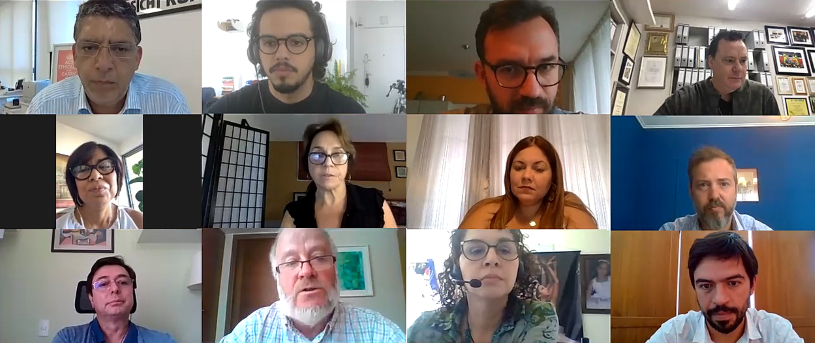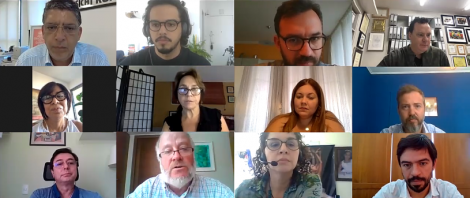Brazil holds Global Alliance meeting
The group discussed cultural diversity and representativeness of nations with Justin Green, president of the Global Alliance

The Global Alliance for PR and Communication Management Regional Council for Latin America held on November, 27 a meeting with Justin Green, president of the Global Alliance, and members of the Regional Council and the Latin America chapter. The meeting was mediated by Hamilton dos Santos, a member of the board of GA, responsible for the Regional Council and general director of Aberje. It discussed the regional performance of the institution, which is present in 126 countries in five continents.
The participants of the meeting included Gladys Diaz, Karen Garnik and Jescel Rolón, representatives of the Association of PR Professionals of Puerto Rico; Francisco Aylwin Oyarzún, from the Chilean Corporate Communication Forum; Pedro Cadina, member of the Regional Council for Brazil; Ana Maria Soares, from the University of Medellín; José Pizarro, representative of the Council of PR Professionals of Argentina; Silvina Seiguer, McDonald’s corporate communications director for Latin America South Division, and Tato Carbonaro, both members of the Regional Council for Latin America, in addition to other guests.
The search for representativeness
The Global Alliance is the confederation of the world’s leading communications and PR associations and institutions, representing 280,000 professionals and academic representatives on five continents. The Swiss-based non-profit organization’s mission is to unify the Public Relations profession, raise professional standards worldwide, share knowledge for its members’ benefit, and be the global voice for PR in the public interest.
While opening the meeting, Justin Green stressed the importance that all nations that make up the Global Alliance are genuinely represented. “The GA is an institution that represents professionals around the world, but when I joined in 2000, I realized it lacked cultural diversity and the representativeness of other nations. One of my first tasks was to restructure and reorganize GA. We were able to put into practice a much more welcoming and inclusive system,” he said.
Green said that, after making several changes to ensure greater cultural representativeness, the institution now has about 50 ambassadors representing the Global Alliance worldwide. “We are a version of the United Nations, with different nationalities, cultures, and races together for one purpose.”
Moreover, the creation of Regional Councils – one for each continent – contributed to the increase in the number of ambassadors representing the Global Alliance worldwide.
“It was the result of our constant search for inclusion. We needed to understand what is happening in other cultures and economies. Besides, we removed an old rule that automatically elected a representative from the United States and a representative from the United Kingdom to the board. This is over. Now, any member can apply without any differentiating criteria. We consider fair candidacy a democratic right,” he said.
As for the projects, the management focused on initiatives that offer faster results. According to Green, for this to happen, all the presidents of the Regional Councils made themselves available for discussions with the local members, aiming to bring the leadership closer to the rest of the institution.
“The GA must serve as a community that offers support and help to those in need. 2020 showed us that every cent invested in a project is important, and that is why we have to be even more concerned with providing a return on investment for members.”
In his view, many institutions have realized the relevance of approaching global issues through international associations.
The institution also offers important data for professionals around the world with the Global Capability Framework. “In addition to ensuring the continuity of projects like this, we want to encourage the creation of new initiatives,” said Green.
Good practices in the regional and global view
During the meeting, Aberje’s managing director and board member of GA, Hamilton dos Santos, raised some questions. One concerns how companies should balance their regional and global reach in the post-pandemic moment. GA’s Justin Green believes that multinational companies will always focus on their global reach.
In his view, Business Communication and Public Relations have become increasingly relevant within large organizations. “Global companies from other industries, such as accounting, governance, or business consultancy, for example, can serve as possible threats to the traditional Public Relations service. When it comes to PR, we realize that companies prefer to hire local agencies, and I believe this trend will continue. The local focus is essential for understanding the operating environment, but a company must care about its global reach and look for a connection with different cultures,” he said.
Another issue highlighted by Santos referred to good practices in the Communication sector. “The presidents of the Regional Councils need to submit a report for each meeting of the Board (General Council), and this report provides us with relevant information about the activities that are being conducted in the different countries participating in the GA. Also, presidents are free to use reports from other regions for consulting or guiding project development,” said Green.
COMENTÁRIOS:
Destaques
- Sports as an instrument of Change
- Aberje Launches Newsletter with Economic Panorama
- Charting a Path to Responsible Communication: WPRF 2023 Wraps Up in Chennai, India
- Global Alliance AGM elects new Board 2023
- Aberje discloses its positions on the Fake News Bill (PL 2630/2020)
ARTIGOS E COLUNAS
Marcos Santos Maratona da vidaMônica Brissac Thought Leadership: marca pessoal x reputação corporativaLetícia Tavares Liderança comunicadora: um tema sempre atualHamilton dos Santos Comunicação é estratégica na economia contemporâneaCarlos Parente Um salto ornamental para mergulhar no pires




























